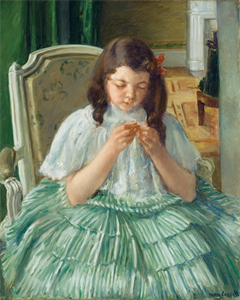
Frank Duveneck
American, 1848–1919
Duveneck’s "Study of a Nude" exemplifies an important teaching technique of the Munich Academy in the nineteenth century; it is also consistent with the School's focus on method rather than subject. The loose qualities of this “oil sketch” were intentional, meant to draw attention to the manner in which the artist handled paint. Instructors such as Wilhelm Liebl (1844–1900) made such pieces to demonstrate to students the appropriate way to apply and manipulate the oil medium. In Munich, this meant the difficult technique of painting "alla prima", which required the artist to blend paints either on the canvas or on the palette to create specific transitions from one tone to the next. Here, Duveneck established the rich tonal values of the skin on this figure’s back and arms by mixing colors in broad, sweeping strokes. Of course such works were executed rapidly, beginning with a warm, dark wash of paint over the canvas and building up the form progressively, with the goal of maintaining the sense of the paint’s inherent fluidity.
American, 1848–1919
Study of a Nude
about 1877–1880
Object Type:
Painting
Creation Place:
North America, American, Ohio
Dimensions:
34 in. x 26 in. (86.36 cm x 66.04 cm)
Medium and Support:
Oil on canvas
Accession Number:
1936.0049
Credit Line:
Gift of Mrs. Margaret Freer
Copyright:
© Montgomery Museum of Fine Arts
Duveneck’s "Study of a Nude" exemplifies an important teaching technique of the Munich Academy in the nineteenth century; it is also consistent with the School's focus on method rather than subject. The loose qualities of this “oil sketch” were intentional, meant to draw attention to the manner in which the artist handled paint. Instructors such as Wilhelm Liebl (1844–1900) made such pieces to demonstrate to students the appropriate way to apply and manipulate the oil medium. In Munich, this meant the difficult technique of painting "alla prima", which required the artist to blend paints either on the canvas or on the palette to create specific transitions from one tone to the next. Here, Duveneck established the rich tonal values of the skin on this figure’s back and arms by mixing colors in broad, sweeping strokes. Of course such works were executed rapidly, beginning with a warm, dark wash of paint over the canvas and building up the form progressively, with the goal of maintaining the sense of the paint’s inherent fluidity.
Keywords
Click a term to view the records with the same keyword
Portfolio List
Click a portfolio name to view all the objects in that portfolio
This object is a member of the following portfolios:
Your current search criteria is: All Object records.

 by Artist (743)
by Artist (743)
